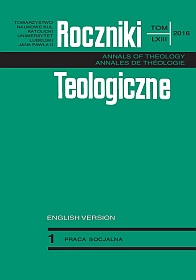The Voice Beyond Us J. Ratzinger/Benedict XVI’s Theses About Conscience
Abstract
Many times culture and liberal and democratic mentality of post-modern Europe juxtapose individual conscience with objective and commonly valid moral law, treating the former as completely autonomous, while replacing the latter with the law established by majority. J. Ratzinger/Benedict XVI reminds that conscience is a subjective norm, but the one that is not deprived of objective reference. As the ability inherent in human nature by God's intention, it corresponds with the order of things, also established by God, and links a will (freedom) of man with the will (freedom) of God. Rationality, characteristic of a man, and expressing through conscience as the ability to get to know the truth of existence and distinguish good from evil, has its roots in obedience, that is the readiness to listen to. Thus, conscience is, in essence, an ability to listen to God and co-knowledge about Him. That is why, prayer and respect for teaching of the Church play crucial role in shaping conscience and neither cognition mistake nor personal ignorance either do not justify or finally release the man’s guilt. It is crucified and resurrected Christ who justifies, and requirements of conscience lead to Christ, through remorse.
References
Benedikt XVI, The Listening Heart. Reflections on the Foundations of Law, https://w2.vatican.va/content/benedict-xvi/en/speeches/2011/september/documents/hf_ben-xvi_spe_20110922_reichstag-berlin.html.
Benedykt XVI, Encyklika Spe salvi (30.11.2007).
Benedict XVI. Mistrzynie duchowe. Poznań: W drodze, 2012.
Benedict XVI. Myśli duchowe. Translated by Wiesław Szymona. Poznań: W drodze, 2008.
Benedict XVI. Learning to Believe. London: St Pauls, 2014. Translated by Wiesław Szymona. Kraków: Esprit 2013.
Benedict XVI. Radość wiary. Edited by Giuliano Vigini, polish edited by Marcin Romanowski. Częstochowa: Edycja Świętego Pawła, 2012.
Benedict XVI/Josef Ratzinger. John Paul II: My Beloved Predecessor. Boston: Pauline Books, 2007. Translated by Robert Łobko. Częstochowa: Edycja Świętego Pawła, 2007.
Gutiérrez, Gustavo. “Duchowość wydarzenia soborowego.” In Ubóstwo, edited by Gerhard L. Müller, translated by Sławomir Śledziewski. 91-115. Lublin: Wydawnictwo KUL, 2014.
Jan Paweł II, Pamięć i tożsamość. Rozmowy na przełomie tysiącleci. Kraków: Znak, 2005.
Nichols, Aidan. The Thought of Benedict XVI, New York: Burns&Oats, 2005.
Müller, Gerhard L. Ubóstwo. Translated by Sławomir Śledziewski. Lublin: Wydawnictwo KUL 2014.
Ratzinger, Joseph. A Turning Point for Europe. San Francisco: Ignatius Press, 1994.
Ratzinger, Joseph. Europa Benedykta w kryzysie kultur. Translated by Wiesława Dzieża. Częstochowa: Edycja Św. Pawła, 2005.
Ratzinger, Joseph. Principles of Catholic Theology: Building Stones for a Fundamental Theology. San Francisco: Ignatius Press, 1987. Translated by Wiesław Szymona. Poznań: W drodze, 2009.
Ratzinger, Joseph. Opera Omnia, vol. 12: Głosiciele Słowa i słudzy Waszej radości. Teologia i duchowość sakramentu święceń. Edited by Krzysztof Góźdź, Marzena Górecka, translated by Marzena Górecka, Monika Rodkiewicz, Joachim Kobienia, Dominik Petruk. Lublin: Wydawnictwo KUL 2012.
Ratzinger, Joseph. Gesammelte Schriften, vol 8/1: Kirche – Zeichen unter den Völkern. Schriften zur Ekklesiologie und Ökumene. Freiburg–Basel–Wien: Herder, 2010.
Ratzinger, Joseph. Church, Ecumenism & Politics. San Francisco: Ignatius Press, 2006. Edited and translated by Lucjan Balter et al. Poznań–Warszawa: Pallottinum, 1990.
Ratzinger, Joseph. Opera Omnia, vol. 8/1: Kościół – znak wśród narodów. Pisma eklezjologiczne i ekumeniczne. Edited by Krzysztof Góźdź, Marzena Górecka, translated by Wiesław Szymona. Lublin: Wydawnictwo KUL, 2013.
Ratzinger, Joseph. Opera Omnia, vol. 8/2: Kościół – znak wśród narodów. Pisma eklezjologiczne i ekumeniczne. Edited by Krzysztof Góźdź, Marzena Górecka, translated by Wiesław Szymona. Lublin: Wydawnictwo KUL, 2013.
Ratzinger, Joseph. Gesammelte Schriften, vol. 12: Künder des Wortes und Diener eurer Freude. Freiburg–Basel–Wien: Herde 2010.
Ratzinger, Joseph. “O nihilizmie, piekle i kryzysie w Kościele.” Edited by Paweł Lisicki, Grzegorz Górny, and Rafał Smoczyński. Fronda 1999, no 15-16: 6-21.
Ratzinger, Joseph. Principles of Christian Morality Whit cooparated Heinz Schürmann, Hans Urs von Balthasar. San Francisco: Ignatius Press, 2006. Translated by Elżbieta Adamiak. Poznań: W drodze, 1999.
Ratzinger, Joseph. “Conscience and Truth”. In Crisis of Conscience, edited by John M. Haas (New York: Crossroads, 1996. Translated by Grzegorz Sowinski. Kraków: Znak, 1999.
Ratzinger, Joseph. Wykłady bawarskie z lat 1963-2004. Translated by Andrzej Czarnocki. Warszawa: Instytut Wydawniczy PAX, 2009.
Ratzinger, Joseph/Benedykt XVI. Jesus of Nazareth, vol. 1. New York: Doubleday, 2007.
Ratzinger, Joseph/Benedykt XVI. Kościół. Wspólnota w drodze. Translated by Dariusz Chodyniecki. Kielce: Jedność, 2009.
Rowland, Tracey. Ratzinger’s Faith. The Theology of Pope Benedict XVI. Oxford: OUP, 2008. Translated by Aleksander Gomola. Kraków: Wydawnictwo WAM, 2010.
Szymik, Jerzy. Theologia benedicta, vol. 2. Katowice: Księgarnia św. Jacka, 2012.
Tornielli, Andrea. Ratzinger. Strażnik wiary. Translated by Bernadeta Tomaszek. Kraków: Salwator, 2005.
Valli, Aldo M. Ratzinger na celowniku. Dlaczego go atakują? Dlaczego jest słuchany? Translated by Marcin Masny. Kraków: Wydawnictwo św. Stanisława BM, 2011.
Copyright (c) 2016 Roczniki Teologiczne

This work is licensed under a Creative Commons Attribution-NonCommercial-NoDerivatives 4.0 International License.





